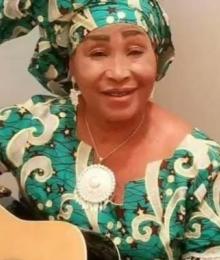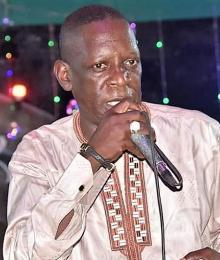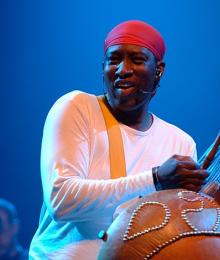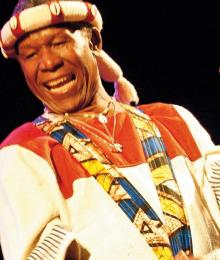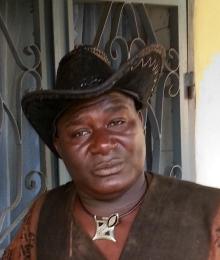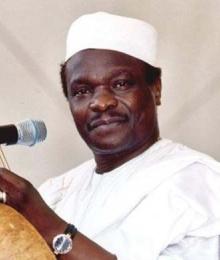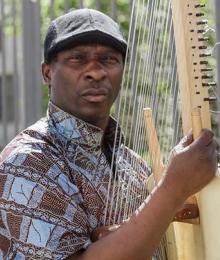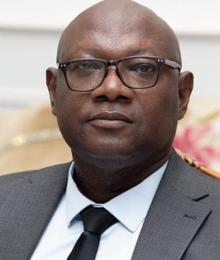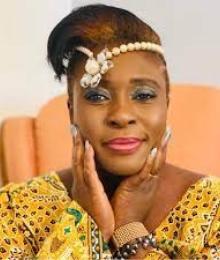
Sia Tolno is an acclaimed Guinean singer who has established herself as one of the most powerful voices in contemporary African music. Born in 1975 in Guéckédou, she overcame the challenges of civil war and forced exile to build an impressive musical career that earned her the prestigious RFI Discoveries Award in 2011.
Known for her powerful vocals often compared to legends like Angélique Kidjo and Miriam Makeba, Tolno creates music that uniquely blends traditional African rhythms (Kissi, Mandingo) with modern genres like afrobeat, funk, blues, and soul. She sings in multiple languages (Kissi, Mendi, Susu, English, French, and Creole) and uses her platform to advocate for social justice and the well-being of African people, particularly addressing issues like immigration and conflict, while celebrating African women's resilience through her energetic and engaging music.
Introduction
Born on February 21, 1975, in Guéckédou, a city located in southeastern Guinea at the border with Liberia and Sierra Leone, Sia Tolno has established herself as one of the most remarkable voices in contemporary African music. Her name, which means "first daughter of the family" in Kissi (her mother tongue), already foretells the destiny of a pioneer.
Winner of the prestigious RFI Discoveries Award in 2011, this Guinean artist perfectly embodies the modern African woman: determined, committed, and creative. Often compared to legends like Angélique Kidjo and Miriam Makeba for her vocal power and stage charisma, Sia Tolno has carved out a path in the traditionally male-dominated universe of Afrobeat.
Earlier Life Between Two Worlds
Sia Tolno's story begins in a complex family context. Her mother, who owned a nightclub, transmitted her love for traditional Guinean music. However, after her parents' separation, young Sia, then six years old, followed her father to Sierra Leone where the atmosphere changed radically.
A strict French teacher, her father imposed an austere education in a household where music had no place. Raised in the Jehovah's Witnesses community, the young girl nevertheless found outlets through school theater and writing. At 14, she took a microphone in public for the first time to perform the Sierra Leonean national anthem before local authorities.
This adolescence shared between two cultures - her vacations regularly bringing her back to Guinea to her maternal family - forged a unique musical identity at the crossroads of Anglophone and Francophone influences.
Forced Exile and Musical Beginnings
Sia's destiny shifted in 1995 when the civil war in Sierra Leone forced her to flee to her native town of Guéckédou. Unfortunately, this region was in turn affected by conflicts, which led her to settle in Conakry, the Guinean capital, in the early 2000s.
It was in Conakry's cabarets that Sia Tolno cut her musical teeth. Her powerful voice impressed audiences when she performed covers of international artists like Whitney Houston, Tina Turner, and even Édith Piaf. These venues became true training schools for her.
In 2001, she self-produced her first album, "La Voix de la forêt (Zool)," where she sang in Kissi and explored different musical styles, including zouk. Already rewarded with a Golden Djembe in the category "Best Female Voice of the Year," Sia nevertheless kept her feet on the ground and simultaneously conducted commercial activities to make ends meet, particularly trading red oil with Gambia and dried fish with Europe.
Revelation to the General Public
The year 2008 marked a turning point in her career when she participated in the pan-African show "Africa Star." Although she ranked fourth at the end of the three-month competition, her performance impressed Gabonese singer Pierre Akendengue, who recommended her to Cesaria Evora's producer.
Her album "Eh Sanga" (which means "suffering" in Kissi) was released in May 2009. Produced and arranged by master Kanté Manlifa, this record with Mandingo accents allowed her to emerge from the shadows and perform in Paris as the opening act for Cesaria Evora.
However, it was with her next album, "My Life" (2011), that Sia Tolno truly found her artistic voice. Recorded in Mory Kanté's studios in Conakry and arranged by Frenchman François Bréant (collaborator of Salif Keita), this opus highlighted her Anglophone influences while addressing committed themes such as "demokilling," her pessimistic vision of African democracy.
International Recognition
In 2011, Sia Tolno won the RFI Discoveries Award, ahead of South African Bongeziwe Mabandla and Senegalese Metzo Djatah. This recognition offered her international visibility and the opportunity to tour more than twenty countries in Africa and the Indian Ocean for about thirty concerts.
It was during this journey that songs like "Mouka Mouka," inspired by her visit to Kenya, were born, which can be found on the album "African Woman" released in June 2014. Produced by Tony Allen, former drummer of Fela Kuti and an Afrobeat legend, this album allowed the singer to show a very energetic side by conjugating Nigerian Afrobeat, a genre traditionally dominated by men, in the feminine.
In 2016 and 2017, she demonstrated her social commitment by giving free concerts in Kissidougou, Gueckedou, and Conakry in tribute to the victims of the Ebola virus in Guinea.
Artist with Multiple Facets
In January 2018, "This Train" was released, an album that again illustrates the stylistic diversity claimed by the artist. It features reggae, rhythm and blues, and even electro influences, as well as surprising covers like "Bang Bang (My Baby Shot Me Down)" popularized by Nancy Sinatra and "Je suis malade" by Serge Lama.
From 2019, her career took on an international dimension with concerts in Italy, Spain, the Netherlands, and Canada. In 2020, despite the pandemic context, she performed in Barcelona accompanied by Aaron Feder's Alma Afrobeat group, an American musician based in Spain.
The year 2021 was marked by the release of several singles in collaboration with Guinean artists: "Je Chante," "Toumbélé" (with Ans-T Crazy), and "Koulélé" (in a duet with Saifond Balde).
Constant Commitment
Beyond her artistic journey, Sia Tolno distinguishes herself through her social and political engagement. Without belonging to any particular political party, she uses her music as a mouthpiece to denounce injustices and support causes close to her heart.
In 2022, she responded to the Russian-Ukrainian war with a song simply titled "Ukraine." Moreover, she regularly speaks out against illegal immigration, calling on African governments to "make more efforts to improve the living conditions of populations" to prevent young people from risking their lives attempting to cross the Mediterranean.
Musical Heritage and New Directions
In May 2023, Sia Tolno released a new record project titled "Baya," referring to the beads that women wear around their waists during certain rituals in her country. Co-produced with Aaron Feder, this four-song EP celebrates African female beauty through Mandingo and Afro-blues rhythms.
The summer of 2023 saw her touring the United States for 25 dates, from California to Chicago through New York. During these concerts, she alternated between her personal repertoire and that of the Afro Dead collective she had joined, a project that revisits the songs of the American band Grateful Dead through an African musical approach.
On October 1, 2023, she was featured at the prestigious Nuit de la Guinée organized at the Zénith in Paris, confirming her status as a cultural ambassador of her country of origin.
Discography
- 2001: La Voix de la forêt (Zool)
- 2009: Eh Sanga
- 2011: My Life
- 2014: African Woman
- 2018: This Train
- 2022: Ukraine (single)
- 2023: Baya (EP)
Unique Musical Heritage
Sia Tolno's work is characterized by a unique musical fusion, fruit of her cross-border journey between Guinea and Sierra Leone. Her music blends traditional African rhythms (Kissi, Mandingo) with modern sounds like Afrobeat, funk, blues, and soul.
A polyglot, she sings in Kissi, Mende, Susu, English, French, and Creole, thus reflecting the cultural richness of West Africa. Her powerful voice and talent as a composer have earned her comparisons to legends like Miriam Makeba.
Sia Tolno perfectly embodies this new generation of African artists who, while remaining deeply rooted in their traditions, open themselves to the world and carry a universal message. Through her committed and energetic music, she celebrates the resilience of African women and calls for a better future for her continent.
As she herself declares: "If being a politician means committing to the well-being of my people and denouncing all discrimination, then I am one without belonging to any political party." This statement perfectly summarizes the spirit that animates this exceptional artist, whose journey inspires far beyond African borders.
Private Life
Sia Tolno's private life is marked by a difficult childhood that shaped her personality and her art. She experienced her parents' separation early, following her father to Sierra Leone at the age of six where she lived in an austere and strict environment. Her father, a French teacher, imposed a severe education on her, and she also suffered harassment from her stepmother.
Her life has also been marked by the loss of her mother, Fatoumata Kumba, who died in June 2019, a painful event she commemorated publicly a year later. More recently, on April 24, 2025, she was involved in an incident with Guinean authorities, having apparently been mistreated by gendarmes at the High Command of the Gendarmerie following the confiscation of a drone in her luggage at the Guinea-Sierra Leone border, which demonstrates the difficulties that public figures can encounter in the region.
Conclusion
In conclusion, Sia Tolno represents an emblematic figure of contemporary African music, whose extraordinary journey testifies to unwavering determination in the face of adversity. From her childhood shared between two cultures to her international recognition, this Guinean artist has known how to transform trials into creative force. Her powerful voice, unique musical fusion, and constant commitment to causes close to her heart make her much more than just a singer – she has become a true cultural ambassador who transcends borders. Through her art, Sia Tolno reminds us that music remains a universal language capable of carrying profound messages while celebrating the richness and resilience of African identity.











